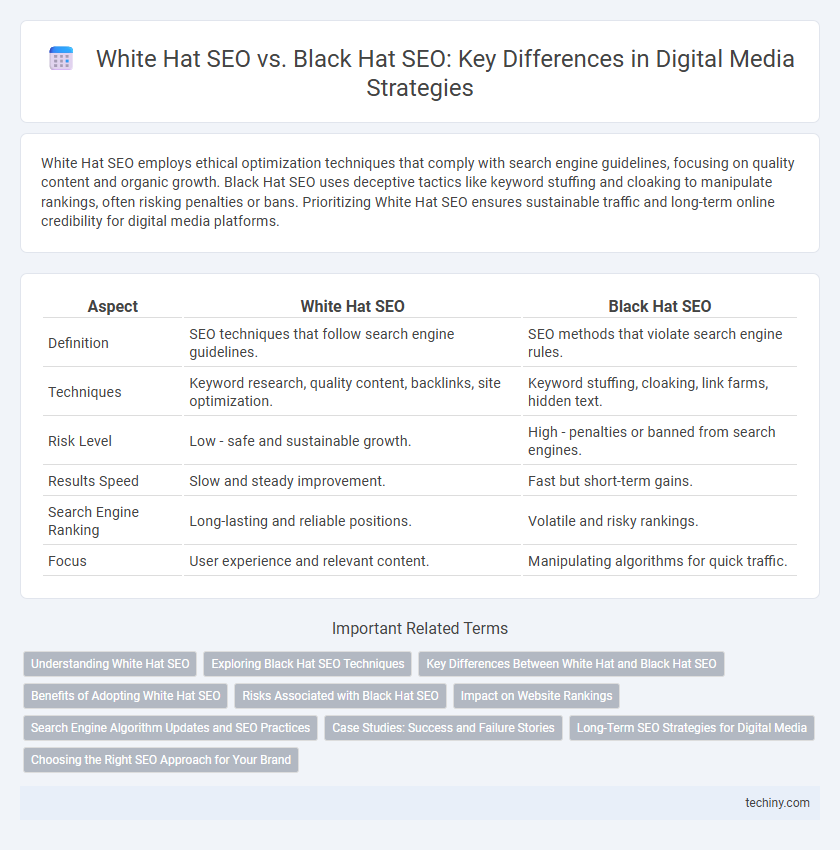White Hat SEO employs ethical optimization techniques that comply with search engine guidelines, focusing on quality content and organic growth. Black Hat SEO uses deceptive tactics like keyword stuffing and cloaking to manipulate rankings, often risking penalties or bans. Prioritizing White Hat SEO ensures sustainable traffic and long-term online credibility for digital media platforms.
Table of Comparison
| Aspect | White Hat SEO | Black Hat SEO |
|---|---|---|
| Definition | SEO techniques that follow search engine guidelines. | SEO methods that violate search engine rules. |
| Techniques | Keyword research, quality content, backlinks, site optimization. | Keyword stuffing, cloaking, link farms, hidden text. |
| Risk Level | Low - safe and sustainable growth. | High - penalties or banned from search engines. |
| Results Speed | Slow and steady improvement. | Fast but short-term gains. |
| Search Engine Ranking | Long-lasting and reliable positions. | Volatile and risky rankings. |
| Focus | User experience and relevant content. | Manipulating algorithms for quick traffic. |
Understanding White Hat SEO
White Hat SEO employs ethical strategies aligned with search engine guidelines, emphasizing high-quality content, relevant keywords, and user experience to improve organic rankings. It focuses on sustainable growth through white-hat techniques such as keyword research, content optimization, and acquiring legitimate backlinks. Prioritizing transparency and compliance ensures long-term website authority and trustworthiness in digital media.
Exploring Black Hat SEO Techniques
Black Hat SEO techniques exploit search engine algorithms through methods like keyword stuffing, cloaking, and link farming to manipulate rankings. These unethical strategies often lead to short-term gains but pose significant risks including penalties or complete removal from search engine results. Understanding the mechanics of Black Hat SEO is crucial for digital marketers aiming to avoid detrimental practices and maintain long-term online visibility.
Key Differences Between White Hat and Black Hat SEO
White Hat SEO employs ethical strategies like keyword research, quality content creation, and natural link building to improve search engine rankings, ensuring long-term benefits and compliance with Google's guidelines. Black Hat SEO uses manipulative tactics such as keyword stuffing, cloaking, and link farms, which can lead to quick ranking boosts but carry high risks of penalties and search engine bans. The fundamental difference lies in White Hat's focus on user experience and sustainability, while Black Hat prioritizes rapid results at the potential cost of website credibility.
Benefits of Adopting White Hat SEO
White Hat SEO techniques enhance website credibility and user experience by adhering to search engine guidelines, leading to sustainable, long-term organic traffic growth. Implementing ethical practices such as quality content creation, keyword research, and legitimate link-building boosts search engine rankings while minimizing the risk of penalties or de-indexing. Businesses adopting White Hat SEO benefit from improved brand reputation, higher visitor engagement, and consistent visibility in search engine results pages (SERPs).
Risks Associated with Black Hat SEO
Black Hat SEO techniques, such as keyword stuffing, cloaking, and using private link networks, pose significant risks including severe penalties from search engines like Google, which can lead to a complete removal from search results. Websites employing these deceptive strategies face long-term damage to domain authority and trustworthiness, dramatically reducing organic traffic and online visibility. The recovery process after such penalties is often costly and time-consuming, making adherence to White Hat SEO practices a critical strategy for sustainable digital media growth.
Impact on Website Rankings
White Hat SEO techniques enhance website rankings by following search engine guidelines and improving user experience through quality content and ethical link-building strategies. Black Hat SEO practices, such as keyword stuffing and cloaking, can lead to rapid ranking gains but risk severe penalties including site de-indexing and lost trust from search engines. Long-term website authority and sustainable traffic growth depend heavily on adopting White Hat SEO methods.
Search Engine Algorithm Updates and SEO Practices
White Hat SEO employs ethical strategies aligned with search engine algorithm updates, emphasizing quality content, keyword relevance, and natural link building to improve rankings sustainably. Black Hat SEO exploits loopholes in algorithms through tactics like keyword stuffing, cloaking, and link schemes, which may yield short-term gains but risk penalties or de-indexing after algorithm updates. Continuous adaptations by search engines, such as Google's Panda and Penguin updates, penalize manipulative Black Hat techniques, reinforcing the importance of compliant White Hat SEO for long-term digital media success.
Case Studies: Success and Failure Stories
Case studies reveal that White Hat SEO strategies, emphasizing quality content and ethical link-building, consistently drive sustainable organic traffic growth and improved search rankings over time. Conversely, Black Hat SEO tactics, such as keyword stuffing and cloaking, may yield rapid short-term gains but often result in severe penalties from search engines, including ranking drops or complete deindexing. Analyzing case studies like the recovery of companies penalized by Google's Panda update demonstrates the long-term value of compliant SEO practices in digital media success.
Long-Term SEO Strategies for Digital Media
White Hat SEO techniques prioritize ethical optimization practices, focusing on high-quality content, user experience, and sustainable link-building to ensure lasting search engine rankings. Black Hat SEO employs manipulative tactics like keyword stuffing and cloaking, which might yield quick visibility gains but risk severe penalties and long-term ranking loss. For digital media, adopting White Hat SEO strategies ensures consistent organic traffic growth and brand credibility over time, critical for maintaining digital authority in competitive markets.
Choosing the Right SEO Approach for Your Brand
White Hat SEO emphasizes ethical techniques such as high-quality content creation, keyword research, and organic link-building that align with search engine guidelines, ensuring sustainable long-term growth for your brand's online presence. Black Hat SEO uses manipulative tactics like keyword stuffing, cloaking, and link schemes to achieve quick rankings but risks severe penalties, including de-indexing from search engines. Selecting the right SEO approach depends on your brand's goals, budget, and commitment to maintaining digital credibility and user trust.
White Hat SEO vs Black Hat SEO Infographic

 techiny.com
techiny.com